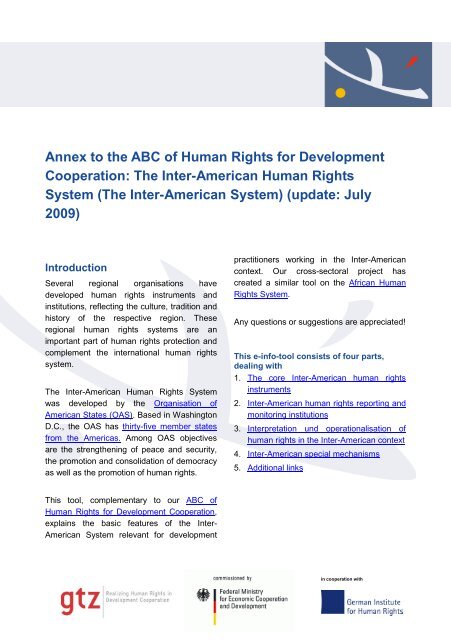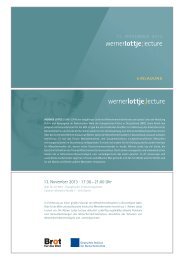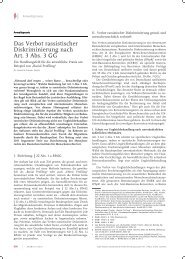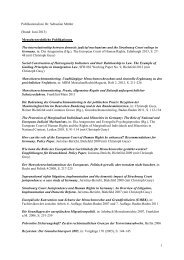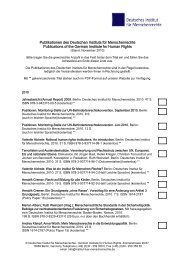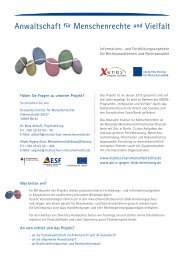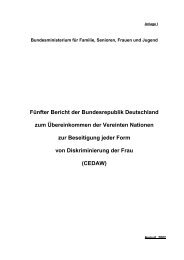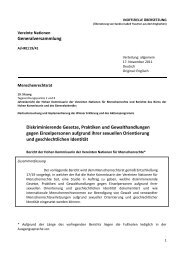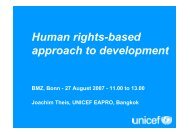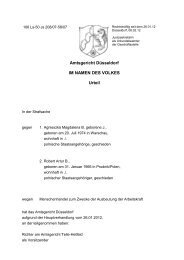The ABC of the Inter-American Human Rights System for ...
The ABC of the Inter-American Human Rights System for ...
The ABC of the Inter-American Human Rights System for ...
You also want an ePaper? Increase the reach of your titles
YUMPU automatically turns print PDFs into web optimized ePapers that Google loves.
Annex to <strong>the</strong> <strong>ABC</strong> <strong>of</strong> <strong>Human</strong> <strong>Rights</strong> <strong>for</strong> Development<br />
Cooperation: <strong>The</strong> <strong>Inter</strong>-<strong>American</strong> <strong>Human</strong> <strong>Rights</strong><br />
<strong>System</strong> (<strong>The</strong> <strong>Inter</strong>-<strong>American</strong> <strong>System</strong>) (update: July<br />
2009)<br />
Introduction<br />
Several regional organisations have<br />
developed human rights instruments and<br />
institutions, reflecting <strong>the</strong> culture, tradition and<br />
history <strong>of</strong> <strong>the</strong> respective region. <strong>The</strong>se<br />
regional human rights systems are an<br />
important part <strong>of</strong> human rights protection and<br />
complement <strong>the</strong> international human rights<br />
system.<br />
<strong>The</strong> <strong>Inter</strong>-<strong>American</strong> <strong>Human</strong> <strong>Rights</strong> <strong>System</strong><br />
was developed by <strong>the</strong> Organisation <strong>of</strong><br />
<strong>American</strong> States (OAS). Based in Washington<br />
D.C., <strong>the</strong> OAS has thirty-five member states<br />
from <strong>the</strong> Americas. Among OAS objectives<br />
are <strong>the</strong> streng<strong>the</strong>ning <strong>of</strong> peace and security,<br />
<strong>the</strong> promotion and consolidation <strong>of</strong> democracy<br />
as well as <strong>the</strong> promotion <strong>of</strong> human rights.<br />
practitioners working in <strong>the</strong> <strong>Inter</strong>-<strong>American</strong><br />
context. Our cross-sectoral project has<br />
created a similar tool on <strong>the</strong> African <strong>Human</strong><br />
<strong>Rights</strong> <strong>System</strong>.<br />
Any questions or suggestions are appreciated!<br />
This e-info-tool consists <strong>of</strong> four parts,<br />
dealing with<br />
1. <strong>The</strong> core <strong>Inter</strong>-<strong>American</strong> human rights<br />
instruments<br />
2. <strong>Inter</strong>-<strong>American</strong> human rights reporting and<br />
monitoring institutions<br />
3. <strong>Inter</strong>pretation und operationalisation <strong>of</strong><br />
human rights in <strong>the</strong> <strong>Inter</strong>-<strong>American</strong> context<br />
4. <strong>Inter</strong>-<strong>American</strong> special mechanisms<br />
5. Additional links<br />
This tool, complementary to our <strong>ABC</strong> <strong>of</strong><br />
<strong>Human</strong> <strong>Rights</strong> <strong>for</strong> Development Cooperation,<br />
explains <strong>the</strong> basic features <strong>of</strong> <strong>the</strong> <strong>Inter</strong>-<br />
<strong>American</strong> <strong>System</strong> relevant <strong>for</strong> development<br />
in cooperation with
1. <strong>The</strong> core <strong>Inter</strong>-<strong>American</strong> human<br />
rights instruments<br />
<strong>The</strong> <strong>American</strong> Convention on <strong>Human</strong> <strong>Rights</strong><br />
<strong>of</strong> 1969 (<strong>American</strong> Convention), based on <strong>the</strong><br />
OAS Charter <strong>of</strong> 1948 and <strong>the</strong> <strong>American</strong><br />
Declaration on <strong>the</strong> <strong>Rights</strong> and Duties <strong>of</strong> Man<br />
<strong>of</strong> 1948 (<strong>American</strong> Declaration), constitutes<br />
<strong>the</strong> core <strong>of</strong> <strong>the</strong> <strong>Inter</strong>-<strong>American</strong> <strong>Human</strong> <strong>Rights</strong><br />
<strong>System</strong> (<strong>Inter</strong>-<strong>American</strong> <strong>System</strong>).<br />
<strong>The</strong> <strong>Inter</strong>-<strong>American</strong> <strong>System</strong> emerged with <strong>the</strong><br />
adoption <strong>of</strong> <strong>the</strong> <strong>American</strong> Declaration. Just as<br />
<strong>the</strong> Universal Declaration <strong>of</strong> <strong>Human</strong> <strong>Rights</strong><br />
(1948), it contains civil and political as well as<br />
economic, social and cultural rights. In<br />
addition to those, it expressly imposes duties<br />
on individuals, such as <strong>the</strong> duty to vote, <strong>the</strong><br />
duty to receive instruction and <strong>the</strong> duty to<br />
obey <strong>the</strong> law. Again, similar to <strong>the</strong> Universal<br />
Declaration, it was adopted as a declaration,<br />
not as a legally binding treaty. However, <strong>the</strong><br />
<strong>Inter</strong>-<strong>American</strong> Court <strong>of</strong> <strong>Human</strong> <strong>Rights</strong> held in<br />
its Advisory Opinion OC-10/89 that those<br />
rights <strong>of</strong> <strong>the</strong> <strong>American</strong> Declaration that are<br />
also guaranteed by <strong>the</strong> OAS Charter do<br />
constitute legal obligations <strong>for</strong> all OAS<br />
member states.<br />
<strong>The</strong> <strong>American</strong> Convention builds on <strong>the</strong><br />
<strong>American</strong> Declaration, but is almost<br />
exclusively concerned with civil and political<br />
rights. It contains only one provision (Art. 26)<br />
on <strong>the</strong> progressive realization <strong>of</strong> economic,<br />
social and cultural rights through domestic<br />
measures and international cooperation. <strong>The</strong><br />
<strong>American</strong> Convention is legally binding on <strong>the</strong><br />
twenty-five states that have ratified it. <strong>The</strong><br />
USA and Canada, <strong>for</strong> example, have not yet<br />
done so.<br />
<strong>The</strong> <strong>Inter</strong>-<strong>American</strong> <strong>System</strong> has gradually<br />
expanded with <strong>the</strong> adoption <strong>of</strong> two Additional<br />
Protocols to <strong>the</strong> <strong>American</strong> Convention. <strong>The</strong><br />
Protocol on Economic, Social and Cultural<br />
<strong>Rights</strong> (Protocol <strong>of</strong> San Salvador, 1988)<br />
integrates <strong>the</strong> protection <strong>of</strong> those rights in <strong>the</strong><br />
<strong>Inter</strong>-<strong>American</strong> <strong>System</strong>. Similar to <strong>the</strong> UN<br />
human rights system, <strong>the</strong> Protocol <strong>of</strong> San<br />
Salvador provides <strong>for</strong> a reporting procedure<br />
under which states submit periodic reports to<br />
<strong>the</strong> Secretary-General <strong>of</strong> <strong>the</strong> OAS. Out <strong>of</strong><br />
thirty-five OAS member states, fourteen have<br />
ratified <strong>the</strong> Protocol so far. <strong>The</strong> Protocol to<br />
Abolish <strong>the</strong> Death Penalty was adopted in<br />
1990, and to date has been ratified by eleven<br />
states.<br />
Apart from <strong>the</strong>se instruments, <strong>the</strong>re are a<br />
number <strong>of</strong> o<strong>the</strong>r regional human rights<br />
treaties.<br />
<strong>The</strong> core <strong>Inter</strong>-<strong>American</strong> human rights<br />
instruments (in chronological order) and<br />
<strong>the</strong> number <strong>of</strong> ratifying states<br />
<strong>American</strong> Declaration on <strong>the</strong> <strong>Rights</strong> and Duties <strong>of</strong><br />
Man<br />
<strong>American</strong> Convention on <strong>Human</strong> <strong>Rights</strong><br />
25<br />
<strong>Inter</strong>-<strong>American</strong> Convention to Prevent and Punish<br />
Torture<br />
17<br />
<strong>Inter</strong>-<strong>American</strong> Convention on <strong>the</strong> Forced<br />
Disappearance <strong>of</strong> Persons<br />
13<br />
<strong>Inter</strong>-<strong>American</strong> Convention on <strong>the</strong> Prevention,<br />
Punishment and Eradication <strong>of</strong> Violence against<br />
Women<br />
32<br />
<strong>Inter</strong>-<strong>American</strong> Convention on <strong>the</strong> Elimination <strong>of</strong> All<br />
Forms <strong>of</strong> Discrimination against Persons with<br />
Disabilities<br />
17<br />
Last Update: July 2009<br />
A universal instrument particularly relevant in<br />
<strong>the</strong> <strong>Inter</strong>-<strong>American</strong> context is <strong>the</strong> <strong>Inter</strong>national<br />
Labour Organisation’s (ILO) Convention 169<br />
concerning Indigenous and Tribal Peoples in<br />
Independent Countries (1991), predominantly<br />
ratified by Latin <strong>American</strong> states. It recognises<br />
<strong>the</strong> collective rights <strong>of</strong> indigenous and tribal<br />
2
peoples such as <strong>the</strong> right to be consulted on<br />
issues <strong>of</strong> <strong>the</strong>ir concern (Art. 6), <strong>the</strong> right to<br />
decide <strong>the</strong>ir own priorities <strong>for</strong> <strong>the</strong> process <strong>of</strong><br />
development as it affects <strong>the</strong>ir lives etc. (Art.<br />
7) or <strong>the</strong> right not to be discriminated against<br />
in <strong>the</strong> enjoyment <strong>of</strong> human rights (Art. 3).<br />
Relevance <strong>for</strong> development cooperation<br />
By ratifying international or regional human<br />
rights treaties, partner countries accept certain<br />
legally binding obligations. <strong>The</strong>se are<br />
essential <strong>for</strong> development strategies not only<br />
because <strong>the</strong>y are <strong>the</strong> legal basis <strong>for</strong><br />
internationally recognized development goals<br />
(see Millennium Declaration). <strong>The</strong>y also<br />
provide useful guidance as to <strong>the</strong> way <strong>the</strong>se<br />
goals can be reached. Thus, <strong>the</strong>y should be<br />
guiding principles <strong>for</strong> setting priorities in<br />
national development goals and processes.<br />
<strong>The</strong> treaties oblige partner countries to<br />
respect, protect and fulfil human rights. <strong>The</strong>y<br />
have to abstain from discrimination in access<br />
to primary education. <strong>The</strong>y have to ensure<br />
that non-discriminatory access to basic health<br />
care is secured even though <strong>the</strong> health<br />
system has been privatised. Governments<br />
have to issue policies and programmes and<br />
undertake measures to progressively<br />
establish, <strong>for</strong> example, a fair judicial system or<br />
make available a sufficient number <strong>of</strong><br />
educational or health institutions that are<br />
accessible to all members <strong>of</strong> <strong>the</strong> population<br />
and operate in an acceptable and culturally<br />
adequate manner. <strong>The</strong> obligations arising<br />
from regional human rights treaties should be<br />
addressed in political dialogue. <strong>The</strong>y should<br />
also be part <strong>of</strong> country and sector strategies<br />
and be integrated into programming. If a<br />
partner country has not ratified fundamental<br />
regional human rights treaties or protocols<br />
<strong>the</strong>reto, political dialogue can be an<br />
instrument to urge <strong>for</strong> ratification.<br />
Resources<br />
Status <strong>of</strong> ratification, per treaty<br />
2. <strong>Human</strong> rights reporting and<br />
monitoring institutions<br />
Two institutions monitor human rights within<br />
<strong>the</strong> <strong>Inter</strong>-<strong>American</strong> <strong>System</strong>: <strong>the</strong> <strong>Inter</strong>-<br />
<strong>American</strong> Commission <strong>of</strong> <strong>Human</strong> <strong>Rights</strong> (<strong>the</strong><br />
Commission) and <strong>the</strong> <strong>Inter</strong>-<strong>American</strong> Court <strong>of</strong><br />
<strong>Human</strong> <strong>Rights</strong> (<strong>the</strong> Court).<br />
<strong>The</strong> Commission<br />
<strong>The</strong> Commission, established in 1959, is<br />
based in Washington D.C. and consists <strong>of</strong><br />
seven independent experts (commissioners)<br />
who act in <strong>the</strong>ir individual capacity. <strong>The</strong><br />
Commission receives and investigates<br />
individual complaints alleging human rights<br />
violations, conducts on-site visits, reports on<br />
<strong>the</strong> general human rights situation in OAS<br />
member states, and requests advisory<br />
opinions <strong>of</strong> <strong>the</strong> Court regarding <strong>the</strong><br />
interpretation <strong>of</strong> any regional or international<br />
human rights treaty applicable to <strong>American</strong><br />
states.<br />
<strong>The</strong> two main procedures <strong>of</strong> <strong>the</strong> Commission<br />
under <strong>the</strong> <strong>American</strong> Convention are <strong>the</strong><br />
petition procedure and <strong>the</strong> reporting<br />
procedure.<br />
<strong>The</strong> petition procedure<br />
<strong>The</strong>re are two complaints procedures: an<br />
inter-state complaints and an individual<br />
complaints procedure.<br />
<strong>The</strong> inter-state complaints procedure (Art. 45,<br />
<strong>American</strong> Convention) has been accepted by<br />
ten member states. To date, it has been<br />
invoked only once by Nicaragua v. Costa<br />
Rica. <strong>The</strong> Commission declared <strong>the</strong> complaint<br />
to be inadmissible.<br />
3
<strong>The</strong> Commission accepts two different types<br />
<strong>of</strong> individual complaints: one is governed by<br />
<strong>the</strong> <strong>American</strong> Convention. <strong>The</strong> second is<br />
governed by <strong>the</strong> OAS Charter. In <strong>the</strong><br />
following, we will elaborate on <strong>the</strong> <strong>for</strong>mer only.<br />
Under <strong>the</strong> individual complaints procedure<br />
governed by <strong>the</strong> <strong>American</strong> Convention, any<br />
person, group <strong>of</strong> persons or NGO on behalf <strong>of</strong><br />
any <strong>of</strong> <strong>the</strong> <strong>for</strong>mer may submit a petition<br />
alleging violations <strong>of</strong> <strong>the</strong> rights protected in:<br />
<strong>the</strong> <strong>American</strong> Convention, <strong>the</strong> <strong>American</strong><br />
Declaration, Arts. 8 and 13 <strong>of</strong> <strong>the</strong> Protocol <strong>of</strong><br />
San Salvador, <strong>the</strong> Protocol to Abolish <strong>the</strong><br />
Death Penalty, <strong>the</strong> <strong>Inter</strong>-<strong>American</strong> Convention<br />
to Prevent and Punish Torture, <strong>the</strong> <strong>Inter</strong>-<br />
<strong>American</strong> Convention on Forced<br />
Disappearance <strong>of</strong> Persons, and/or <strong>the</strong> <strong>Inter</strong>-<br />
<strong>American</strong> Convention on <strong>the</strong> Prevention,<br />
Punishment and Eradication <strong>of</strong> Violence. <strong>The</strong><br />
Commission can only process individual<br />
cases against states that have accepted <strong>the</strong><br />
contentious jurisdiction <strong>of</strong> <strong>the</strong> Court.<br />
<strong>The</strong> procedure <strong>for</strong> filing an individual petition<br />
is governed by <strong>the</strong> Statute, <strong>the</strong> rules <strong>of</strong><br />
procedure <strong>of</strong> <strong>the</strong> Commission and Articles 44<br />
and 46 <strong>of</strong> <strong>the</strong> <strong>American</strong> Convention. <strong>The</strong><br />
Commission will only accept a petition if a<br />
number <strong>of</strong> <strong>for</strong>mal requirements have been met<br />
(see Arts. 27 and 28 <strong>of</strong> <strong>the</strong> rules <strong>of</strong><br />
procedure), particularly having exhausted<br />
domestic remedies. If this is <strong>the</strong> case, it will<br />
send <strong>the</strong> petition to <strong>the</strong> state party with a<br />
request <strong>for</strong> relevant in<strong>for</strong>mation. During <strong>the</strong><br />
proceedings, <strong>the</strong> Commission asks each party<br />
to comment on <strong>the</strong> response <strong>of</strong> <strong>the</strong> o<strong>the</strong>r<br />
party. In addition, <strong>the</strong> Commission may carry<br />
out its own investigations, conduct on-site<br />
visits, request fur<strong>the</strong>r in<strong>for</strong>mation from <strong>the</strong><br />
parties, etc. Usually, it <strong>the</strong>n holds a hearing<br />
with both parties and asks <strong>the</strong>m to present<br />
<strong>the</strong>ir respective factual and legal arguments.<br />
As a matter <strong>of</strong> principle, <strong>the</strong> Commission will<br />
firstly <strong>of</strong>fer <strong>the</strong> parties to assist in negotiating a<br />
friendly settlement. If such a settlement was<br />
not achieved, and <strong>the</strong> Commission considers<br />
having sufficient in<strong>for</strong>mation to decide on <strong>the</strong><br />
merits, it prepares a confidential report which<br />
includes its conclusions and<br />
recommendations. It <strong>the</strong>n concedes <strong>the</strong> state<br />
a period <strong>of</strong> time to remedy <strong>the</strong> situation and to<br />
comply with <strong>the</strong> recommendations. At <strong>the</strong><br />
same time, it notifies <strong>the</strong> petitioner <strong>of</strong> <strong>the</strong><br />
adoption <strong>of</strong> <strong>the</strong> report and allows one month<br />
to present his/her position as to whe<strong>the</strong>r <strong>the</strong><br />
case should be submitted to <strong>the</strong> Court.<br />
Upon expiration <strong>of</strong> <strong>the</strong> time granted to <strong>the</strong><br />
state, <strong>the</strong> Commission refers <strong>the</strong> case to <strong>the</strong><br />
Court if <strong>the</strong> state has not complied with <strong>the</strong><br />
recommendations <strong>of</strong> <strong>the</strong> Commission and<br />
accepted <strong>the</strong> contentious jurisdiction <strong>of</strong> <strong>the</strong><br />
Court, unless <strong>the</strong> absolute majority <strong>of</strong> its<br />
members decides o<strong>the</strong>rwise (see, <strong>for</strong><br />
example, Guy Malary v. Haiti).<br />
<strong>The</strong> reporting procedure<br />
<strong>The</strong> only state-reporting procedures within <strong>the</strong><br />
<strong>Inter</strong>-<strong>American</strong> <strong>System</strong> are subject to <strong>the</strong><br />
Protocol <strong>of</strong> San Salvador (see above 1.) and<br />
to <strong>the</strong> <strong>Inter</strong>-<strong>American</strong> Convention on Violence<br />
Against Women. Article 10 <strong>of</strong> <strong>the</strong> latter<br />
requires <strong>the</strong> state to report on measures<br />
regarding <strong>the</strong> prevention and prohibition <strong>of</strong><br />
violence against women to <strong>the</strong> <strong>Inter</strong>-<strong>American</strong><br />
Commission <strong>of</strong> Women.<br />
Apart from that, <strong>the</strong> Commission publishes<br />
annual reports on <strong>the</strong> state <strong>of</strong> human rights<br />
within OAS member states. It also concludes<br />
reports on <strong>the</strong> human rights situation in<br />
singular countries on <strong>the</strong> basis <strong>of</strong> on-site<br />
visits. Finally, it issues reports on specific<br />
human rights topics, such as on access to<br />
justice as a guarantee <strong>of</strong> economic, social and<br />
cultural rights or on access to justice <strong>for</strong><br />
women victims <strong>of</strong> violence in <strong>the</strong> Americas.<br />
4
Resources<br />
a) Case-law <strong>of</strong> <strong>the</strong> Commission<br />
b) Annual reports <strong>of</strong> <strong>the</strong> Commission<br />
c) Country and <strong>the</strong>matic reports <strong>of</strong> <strong>the</strong><br />
Commission<br />
<strong>The</strong> Court<br />
<strong>The</strong> Court was established in 1979 as an<br />
autonomous institution based on <strong>the</strong> <strong>American</strong><br />
Convention and it is seated in San José,<br />
Costa Rica. It consists <strong>of</strong> <strong>the</strong> Secretariat and<br />
seven judges. <strong>The</strong> judges convene in four<br />
ordinary sessions per year. Currently,<br />
extraordinary sessions are convened in<br />
different OAS member states in order to<br />
enhance <strong>the</strong> knowledge on <strong>the</strong> <strong>Inter</strong>-<strong>American</strong><br />
<strong>System</strong>.<br />
<strong>The</strong> Court has both advisory and contentious<br />
jurisdiction. <strong>The</strong> advisory jurisdiction <strong>of</strong> <strong>the</strong><br />
Court is mandatory <strong>for</strong> all state parties to <strong>the</strong><br />
<strong>American</strong> Convention. In addition, any OAS<br />
member state (even if it is not a party to <strong>the</strong><br />
<strong>American</strong> Convention) or OAS organ may<br />
consult <strong>the</strong> Court on <strong>the</strong> interpretation <strong>of</strong> <strong>the</strong><br />
<strong>American</strong> Convention or any o<strong>the</strong>r regional or<br />
international human rights treaty applicable to<br />
<strong>American</strong> states. Advisory opinions are not<br />
legally binding, but provide an authoritative<br />
interpretation <strong>of</strong> <strong>the</strong> legal questions<br />
concerned. <strong>The</strong> contentious jurisdiction <strong>of</strong> <strong>the</strong><br />
Court needs to be accepted separately by<br />
each member state <strong>of</strong> <strong>the</strong> <strong>American</strong><br />
Convention. Currently, twenty-two member<br />
states have done so.<br />
Contentious proceedings be<strong>for</strong>e <strong>the</strong> Court<br />
encompass an individual complaints<br />
procedure. To date, only state parties and <strong>the</strong><br />
Commission have <strong>the</strong> right to submit a case<br />
directly to <strong>the</strong> Court. Usually, <strong>the</strong> Commission<br />
does so on behalf <strong>of</strong> individuals or groups <strong>of</strong><br />
individuals, sometimes upon request <strong>of</strong> an<br />
NGO, acting on behalf <strong>of</strong> individuals.<br />
<strong>The</strong> Court’s Statute, its rules <strong>of</strong> procedure and<br />
<strong>the</strong> <strong>American</strong> Convention govern <strong>the</strong><br />
procedure <strong>for</strong> filing an application. It must be<br />
filed at <strong>the</strong> Secretariat <strong>of</strong> <strong>the</strong> Court. If <strong>the</strong><br />
basic admissibility requirements are met, <strong>the</strong><br />
Court notifies <strong>the</strong> parties involved and gives<br />
<strong>the</strong>m time to present <strong>the</strong>ir arguments. <strong>The</strong><br />
President will <strong>the</strong>n open oral proceedings,<br />
during which <strong>the</strong> parties or <strong>the</strong> Court may<br />
suggest a friendly settlement. <strong>The</strong> Court may<br />
also issue provisional measures in order to<br />
prevent irremediable harm to a person. Any<br />
decision <strong>of</strong> <strong>the</strong> Court is binding and final. In<br />
case <strong>the</strong> Court found a violation, it can award<br />
reparations.<br />
O<strong>the</strong>r institutions<br />
O<strong>the</strong>r institutions within <strong>the</strong> <strong>Inter</strong>-<strong>American</strong><br />
context that address human rights issues are:<br />
<strong>the</strong> <strong>Inter</strong>-<strong>American</strong> Commission <strong>of</strong> Women,<br />
<strong>the</strong> <strong>Inter</strong>-<strong>American</strong> Children's Institute, <strong>the</strong><br />
<strong>Inter</strong>-<strong>American</strong> Indian Institute and <strong>the</strong> <strong>Inter</strong>-<br />
<strong>American</strong> Institute <strong>of</strong> <strong>Human</strong> <strong>Rights</strong>.<br />
Relevance <strong>for</strong> development cooperation<br />
To identify human rights challenges,<br />
development cooperation should draw on <strong>the</strong><br />
Commission’s human rights reports and <strong>the</strong><br />
case law <strong>of</strong> both <strong>the</strong> Commission and <strong>the</strong><br />
Court. <strong>The</strong>se constitute <strong>the</strong> authoritative voice<br />
<strong>of</strong> regional human rights supervisory<br />
institutions. In addition, development<br />
cooperation can build on <strong>the</strong> conclusions and<br />
recommendations <strong>of</strong> those bodies, in political<br />
dialogue, country and sector strategies and<br />
programming. Development cooperation may<br />
also support individuals or groups <strong>of</strong><br />
individuals in filing a case be<strong>for</strong>e <strong>the</strong> <strong>Inter</strong>-<br />
<strong>American</strong> <strong>System</strong> or <strong>the</strong> State in implementing<br />
a judgement <strong>of</strong> <strong>the</strong> Court. By doing so,<br />
development cooperation supports <strong>the</strong> partner<br />
country in fulfilling its related obligations and<br />
5
empowers individuals to develop a<br />
responsible awareness on <strong>the</strong>ir rights.<br />
Resources<br />
a) Case-law <strong>of</strong> <strong>the</strong> Court, by country<br />
b) Advisory Opinions <strong>of</strong> <strong>the</strong> Court<br />
c) Provisional Measures<br />
3. <strong>Inter</strong>pretation and<br />
operationalisation <strong>of</strong> human<br />
rights in <strong>the</strong> <strong>Inter</strong>-<strong>American</strong><br />
context<br />
<strong>The</strong> case law <strong>of</strong> <strong>the</strong> Commission and <strong>the</strong><br />
Court (see above 2.) constitute <strong>the</strong> primary<br />
source <strong>of</strong> interpretation <strong>of</strong> <strong>Inter</strong>-<strong>American</strong><br />
human rights treaties. Although existing case<br />
law deals primarily with civil and political<br />
rights, <strong>the</strong>re are some cases concerned with<br />
economic, social and cultural rights. In <strong>the</strong><br />
case <strong>of</strong> Jorge Odir Miranda Cortez et al. v. El<br />
Salvador, <strong>for</strong> example, <strong>the</strong> Commission<br />
received a petition filed on behalf <strong>of</strong> claimants<br />
who are carriers <strong>of</strong> HIV/AIDS. In <strong>the</strong> case <strong>of</strong><br />
Awas Tigni v. Nicaragua, <strong>the</strong> Court held that<br />
<strong>the</strong> right to property included <strong>the</strong> right <strong>of</strong><br />
indigenous peoples to protection <strong>of</strong> <strong>the</strong>ir<br />
ancestral lands.<br />
O<strong>the</strong>r valuable sources <strong>of</strong> interpretation are<br />
<strong>the</strong> advisory opinions <strong>of</strong> <strong>the</strong> Court (see, <strong>for</strong><br />
example, OC-1/82 with respect to <strong>the</strong><br />
applicability <strong>of</strong> international treaties and OC-<br />
10/89 regarding <strong>the</strong> binding nature <strong>of</strong> <strong>the</strong><br />
<strong>American</strong> Declaration).<br />
In addition, <strong>the</strong> annual, country and <strong>the</strong>matic<br />
reports <strong>of</strong> <strong>the</strong> Commission contribute to <strong>the</strong><br />
interpretation and operationalisation <strong>of</strong> human<br />
rights. <strong>The</strong> latest country report on Bolivia, <strong>for</strong><br />
example, deals with <strong>the</strong> rights <strong>of</strong> different<br />
groups <strong>of</strong> persons in <strong>the</strong> context <strong>of</strong><br />
streng<strong>the</strong>ning democracy.<br />
Relevance <strong>for</strong> development cooperation<br />
<strong>The</strong> country reports <strong>of</strong> <strong>the</strong> Commission give a<br />
comprehensive overview on <strong>the</strong> respective<br />
human rights situations, based on regional<br />
human rights standards. <strong>The</strong>y provide a<br />
valuable source <strong>of</strong> in<strong>for</strong>mation with regard to<br />
<strong>the</strong> realisation <strong>of</strong> those standards and may<br />
identify useful starting points <strong>for</strong> cooperation<br />
activities aiming at improving <strong>the</strong> human rights<br />
situation in a given country. <strong>The</strong> advisory<br />
opinions <strong>of</strong> <strong>the</strong> Court are an authoritative<br />
interpretation <strong>of</strong> particular legal questions.<br />
<strong>The</strong>y usually define <strong>the</strong> scope <strong>of</strong> states’ legal<br />
obligations under regional and international<br />
human rights treaties and can thus give<br />
guidance <strong>for</strong> policy and issues to be taken up<br />
in political dialogue. <strong>The</strong> same holds true <strong>for</strong><br />
judgements <strong>of</strong> <strong>the</strong> Court.<br />
Resources<br />
Annual, country and <strong>the</strong>matic reports <strong>of</strong> <strong>the</strong><br />
Commission.<br />
More case law relating specifically to<br />
economic, social and cultural rights can be<br />
found here (select ‘<strong>Inter</strong>-<strong>American</strong><br />
Commission on <strong>Human</strong> <strong>Rights</strong>’ from <strong>the</strong> drop<br />
down menu). Cases <strong>of</strong> <strong>the</strong> Court relating to<br />
this set <strong>of</strong> rights are, <strong>for</strong> example, Cantos v.<br />
Argentina (right to property), Five Pensioners<br />
v. Peru (right to property and Art. 26,<br />
<strong>American</strong> Convention) and Comunidad<br />
Indigena Yakye Axa v. Paraguay (inter alia<br />
right to property regarding ancestral lands).<br />
4. <strong>Inter</strong>-<strong>American</strong> special<br />
mechanisms<br />
<strong>The</strong> Commission has established several<br />
Special Rapporteurs to monitor OAS member<br />
states’ compliance with <strong>Inter</strong>-<strong>American</strong> human<br />
rights standards. <strong>The</strong>se are, <strong>for</strong> example, <strong>the</strong><br />
Special Rapporteur on Indigenous People, <strong>the</strong><br />
6
Special Rapporteur on <strong>the</strong> <strong>Rights</strong> <strong>of</strong> Women<br />
and <strong>the</strong> Special Rapporteur on Freedom <strong>of</strong><br />
Expression. In addition, <strong>the</strong> Commission has<br />
established a separate unit on human rights<br />
defenders.<br />
<strong>The</strong> Special Rapporteurs issue reports on<br />
country situations on <strong>the</strong> basis <strong>of</strong> on-site<br />
visits, e.g. <strong>the</strong> report <strong>of</strong> <strong>the</strong> Special<br />
Rapporteur on Indigenous People on justice<br />
and social inclusion in Guatemala, and on<br />
<strong>the</strong>matic issues relevant to <strong>the</strong>ir mandate, e.g.<br />
<strong>the</strong> annual report <strong>of</strong> <strong>the</strong> Special Rapporteur on<br />
Freedom <strong>of</strong> Expression. <strong>The</strong> Special<br />
Rapporteurs also give advice in proceedings<br />
be<strong>for</strong>e <strong>the</strong> Court (amicus curiae) and promote<br />
human rights through o<strong>the</strong>r activities (provide<br />
legal advice to states, participate in<br />
international <strong>for</strong> a, trainings etc.).<br />
Relevance <strong>for</strong> development cooperation<br />
Similar to <strong>the</strong> reports issued by <strong>the</strong><br />
Commission, <strong>the</strong> reports <strong>of</strong> <strong>the</strong> Special<br />
Rapporteurs constitute an important source <strong>of</strong><br />
in<strong>for</strong>mation on <strong>the</strong> status <strong>of</strong> human rights with<br />
regard to a specific topic or country. <strong>The</strong>y also<br />
reflect current human rights debates within <strong>the</strong><br />
national, regional or even international setting.<br />
<strong>The</strong>y reveal evolving regional human rights<br />
standards, and can thus be used to <strong>for</strong>mulate<br />
targets, benchmarks and indicators <strong>for</strong><br />
programming in different sectors, but also in<br />
political dialogue.<br />
Resources<br />
a) Reports by <strong>the</strong> Special Rapporteur on <strong>the</strong><br />
<strong>Rights</strong> <strong>of</strong> Women, by country<br />
b) Special Rapporteur on Freedom <strong>of</strong><br />
Expression, annual and country reports<br />
c) Special Rapporteur on Indigenous People,<br />
annual and country reports<br />
5. Additional links<br />
German Technical Cooperation (GTZ), Cross-<br />
Sectoral Project “Realising <strong>Human</strong> <strong>Rights</strong> in<br />
Development Cooperation”<br />
http://www.gtz.de/human-rights<br />
OHCHR <strong>Inter</strong>national Treaties<br />
http://www2.ohchr.org/english/law/index.htm#i<br />
nstruments<br />
FAQs <strong>of</strong> <strong>the</strong> OHCHR on a <strong>Human</strong> <strong>Rights</strong><br />
Based Approach to Development Cooperation<br />
http://www.ohchr.org/Documents/Publications/<br />
FAQen.pdf<br />
Published by<br />
Deutsche Gesellschaft für<br />
Technische Zusammenarbeit (GTZ)<br />
GmbH<br />
Dag-Hammarskjöld Weg 1-5<br />
65760 Eschborn<br />
T +49 (0) 6196 -79-0<br />
E info@gtz.de<br />
I www.gtz.de<br />
Sector Project<br />
„Realizing <strong>Human</strong> <strong>Rights</strong> in Development<br />
Cooperation“<br />
Abt. 42, Staat und Demokratie<br />
7<br />
Contact<br />
Juliane Osterhaus<br />
Tel. 06196 79 1523<br />
juliane.osterhaus@gtz.de<br />
www.gtz.de/human-rights<br />
Eschborn, July 2009


